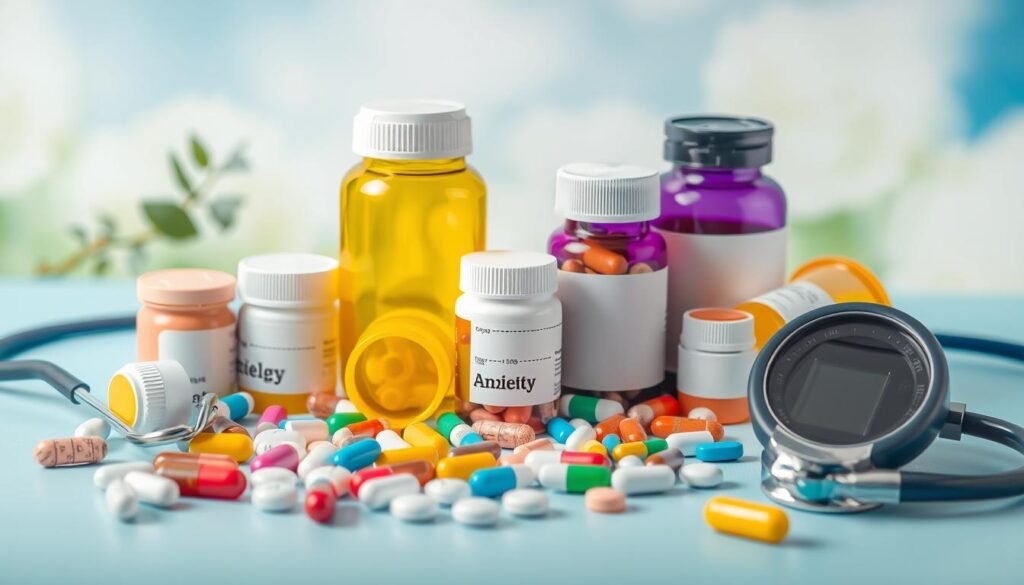About half the adults in the US have hypertension. This fact shows we need to focus on this part of mental health. The link between anxiety and high blood pressure is crucial but often ignored. While anxiety may be temporary, its long-term effects can harm your health. Sadly, just 43.2% of Americans with generalized anxiety disorder are getting treatment. Many are left to deal with their symptoms alone, making their high blood pressure worse.
It’s vital to understand how anxiety and high blood pressure are connected. Chronic stress can make you more likely to get hypertension. Also, the symptoms of high anxiety can lead to higher blood pressure. This affects not just mental health but heart health too. Luckily, therapy and mindful practices can help. Being aware of bad coping habits, like too much drinking, is also key. For more on alcohol and anxiety, check out this hidden connection.
Key Takeaways
- Nearly 50% of U.S. adults suffer from hypertension.
- Anxiety can cause short-term spikes in blood pressure.
- Only a small percentage of individuals diagnosed with anxiety are receiving appropriate treatment.
- Chronic stress can lead to both anxiety and hypertension.
- Lifestyle changes are essential for managing both conditions effectively.
Introduction to Anxiety and High Blood Pressure
Anxiety often comes from daily stress. It makes you feel worried, tense, and uneasy. High blood pressure, or hypertension, affects many in the U.S. It’s important to understand how anxiety and hypertension are linked. This knowledge helps support both physical and mental health.
The link between anxiety and high blood pressure is gaining more focus. A study of 21 reports found anxiety might lead to high blood pressure. Shockingly, 42% of teens studied had high blood pressure, and 45% felt anxious. For those with anxious parents, 53% had high blood pressure too.
Handling anxiety well can help manage blood pressure. Spotting and dealing with both issues early improves health. It also reduces the risks tied to high blood pressure from anxiety. For deeper understanding, check out this detailed study.
Lifestyle affects both anxiety and high blood pressure. High blood pressure can come from bad eating habits or not exercising. It’s key to recognize and act on these factors for a healthier life. Using relaxation methods and making balanced choices can majorly help manage both issues.
What is Anxiety?
Anxiety is a complex emotional state. It is marked by feelings like apprehension, fear, or worry. This state can show in many ways, affecting both your body and mind. People with anxiety may feel a faster heart rate, sweat more than usual, and feel restless. It’s important to know these signs to care for mental health and find good coping ways.
Definition and Symptoms
Anxiety isn’t just a brief feeling; it can be a long-lasting issue. It can change how you handle day-to-day activities. You might find it hard to focus or worry too much. You may also experience tremors or sleep poorly. Feeling tense or unable to sit still are common too.
- Difficulty concentrating
- Excessive worrying
- Trembling or shaking
- Sleep disturbances
- Physical tension or restlessness
Although these symptoms can differ from one person to another, they often raise stress levels and blood pressure. This shows a link between how anxious you feel and how your body reacts.
Common Causes of Anxiety
Anxiety has many root causes, so it’s vital to know what triggers it. This understanding can lead to better handling. Common triggers include:
- Genetic factors
- Environmental stress
- Traumatic events
- Worries about health
- Big life changes or transitions
By tackling the reasons behind anxiety, we can find specific ways to lessen its effect on our mental well-being. Effective treatments can control anxiety symptoms. They help us lead healthier lives.
Understanding High Blood Pressure (Hypertension)
Hypertension, or high blood pressure, is when blood pushes too hard against artery walls. This can cause heart disease and stroke. The CDC says up to half of U.S. adults might have it, often without knowing. That’s why checking your blood pressure regularly is key.
What is Hypertension?
Hypertension develops over years and can be hidden until it causes bigger health issues. Blood pressure is seen as normal, elevated, or high, based on two numbers. High blood pressure can harm your heart and arteries over time.
Risk Factors for High Blood Pressure
Many things can raise your risk for high blood pressure. It’s important to know these to prevent it. These risk factors include:
- Age: Getting older raises your risk.
- Obesity: More body weight can mean higher blood pressure.
- Family history: Some families have a history of hypertension.
- Sedentary lifestyle: Not exercising can make blood pressure go up.
- Unhealthy dietary choices: Too much salt, a lot of alcohol, and bad diets are big factors.
- Stress and anxiety: Long-term stress can affect your blood pressure and weight.
Making lifestyle changes can really help avoid high blood pressure. Managing stress and eating right can keep your mind and heart healthier. If you have anxiety, understanding the gut-brain link might help. Learn more at this website.
The Relationship Between Anxiety and High Blood Pressure
Anxiety and high blood pressure are closely linked, affecting mental and overall health. Learning how these two conditions interact is key. It helps in dealing with them effectively.
How Anxiety Affects Blood Pressure
When anxiety spikes, our bodies react. Hormones like adrenaline and cortisol shoot up, causing blood pressure to rise temporarily. This is part of the body’s fight-or-flight response. But when anxiety is constant, it can lead to long-term high blood pressure. This harms blood vessels and raises health risks.
Research shows a strong connection between anxiety disorders and high blood pressure. About 38% of people with anxiety also suffer from hypertension. Early recognition of anxiety symptoms is crucial for prompt action.
How High Blood Pressure Can Increase Anxiety
High blood pressure can, in turn, fuel anxiety. Worries about hypertension’s health effects can stress people out even more. Fears of heart attacks and other complications add to anxiety. This creates a loop where each condition worsens the other.
This two-way link shows we need to treat both issues together. Effective approaches might include therapy, lifestyle tweaks, and medical advice. You can learn more in this article on managing anxiety and high blood pressure.
Temporary vs. Long-Term Effects of Anxiety on Blood Pressure
Anxiety and blood pressure are closely linked, showing differences between short-term and long-term effects. Understanding these differences helps us manage our health better.
Short-Term Anxiety Reactions
Short-term anxiety shows up in moments like public speaking or job interviews, leading to blood pressure spikes. The body releases stress hormones in these moments. This can quicken the heart rate and narrow blood vessels. Such responses cause a temporary rise in blood pressure, which goes away after the stress does.
Though short-term, these effects are not harmful immediately, repeated stress can hurt heart health over time.
Chronic Anxiety and its Health Implications
Chronic anxiety, on the other hand, has severe health implications. It can cause long-lasting blood pressure increases, pushing toward hypertension. Everyday anxiety can also bring physical changes, like weight gain, especially in the belly. This ups the risk of heart problems later.
Poor lifestyle habits often add to this risk. Those with chronic anxiety might not eat well, exercise enough, or may use substances. All these can make high blood pressure a constant problem.
The link between anxiety and high blood pressure is complex. Studies show that people with ongoing anxiety are more likely to face hypertension. It’s important to tackle these issues for better health.
| Type of Anxiety | Effects on Blood Pressure | Health Implications |
|---|---|---|
| Short-Term Anxiety | Causes temporary blood pressure spikes | May lead to long-term cardiovascular issues if frequent |
| Chronic Anxiety | Results in persistent hypertension | Increased risk of long-term cardiovascular problems |
Common Lifestyle Factors Contributing to Both Conditions
Many factors affect both anxiety and high blood pressure. By understanding them, you can make better health choices. Stress eating and not moving enough are big problems for both these conditions.
Stress Eating and Weight Gain
Stress eating is often a way people deal with anxiety. They eat comfort foods that are sugary and fatty. This leads to gaining weight. And that’s bad for controlling blood pressure.
Too much weight can cause high blood pressure. Emotional eating makes it hard to eat healthy and change your lifestyle. It’s important to know how stress eating affects you. This knowledge helps manage anxiety and blood pressure better.
Physical Inactivity
Not moving much is a big risk for anxiety and high blood pressure. If you don’t exercise, you may feel more anxious and see your blood pressure go up. Exercise is a great way to lower anxiety and manage weight.
Being active is good for your heart and blood pressure. It also helps fight the bad effects of stress. So, regular exercise is key for your health.

Effective Stress Management Techniques
Managing stress well is key to good health. This is especially true for those with high blood pressure and anxiety. Using mindfulness and relaxation exercises can help manage stress. This can lead to better control of blood pressure.
Mindfulness Techniques for Anxiety
Mindfulness includes meditation and breathing exercises. These methods are great for easing anxiety. They improve mental clarity and bring calmness. Practicing mindfulness meditation lowers anxiety and stress. This can also help decrease blood pressure. Just a few minutes of mindfulness each day can offer peace in a busy life.
Relaxation Exercises to Reduce Blood Pressure
Relaxation exercises, like yoga and muscle relaxation, help with stress relief and blood pressure. They allow deep relaxation, fighting stress effectively. Regularly doing these exercises helps people with high blood pressure manage stress better. For more tips on managing stress and heart health, visit this resource.
| Technique | Description | Benefits |
|---|---|---|
| Mindfulness Meditation | A practice where one focuses on the present moment to cultivate awareness. | Reduces anxiety, promotes calm, and may lower blood pressure. |
| Deep Breathing | Involves inhaling deeply through the nose and exhaling slowly through the mouth. | Helps relax the nervous system and claims immediate stress relief. |
| Yoga | A combination of physical postures and breathing techniques. | Enhances flexibility, lowers stress levels, and encourages mindfulness. |
| Progressive Muscle Relaxation | A technique that involves tensing and then relaxing specific muscle groups. | Reduces physical tension and promotes overall relaxation. |
Medication and Treatment Options
Anxiety management often includes medications with various side effects. Knowing these side effects is crucial. It’s also vital to look into high blood pressure treatments. This is because many people might have both conditions at the same time.
Medication for Anxiety and Their Side Effects
Medications for anxiety can really help ease symptoms. Some common types are:
- Benzodiazepines (e.g., alprazolam, clonazepam) for quick anxiety relief
- Selective serotonin reuptake inhibitors (SSRIs) for ongoing control
- Serotonin-norepinephrine reuptake inhibitors (SNRIs) which might raise blood pressure
- Hydroxyzine, an antihistamine that helps with anxiety
- Buspirone, less addictive than benzodiazepines
Different anxiety meds can have side effects like dizziness or increased heart rate. It’s important to talk with a healthcare provider about these risks. This ensures safe treatment.
Medications for Managing High Blood Pressure
There are many options for treating high blood pressure, like:
- Diuretics, to get rid of extra fluid
- ACE inhibitors, which relax blood vessels
- Calcium channel blockers, to ease arterial tension
- Beta-blockers, also good for anxiety, to slow the heart
- Renin inhibitors, reducing substances that raise blood pressure
- Vasodilators, to relax blood vessels for better flow
A good treatment plan might include lifestyle changes and medication. Monitoring blood pressure at home is a good idea to see if the treatment works. Often, using a combination of medications works better than just one.

| Medication Type | Function | Potential Side Effects |
|---|---|---|
| Benzodiazepines | Rapid relief from acute anxiety | Drowsiness, dependency |
| SSRIs | Long-term anxiety disorder management | Nausea, insomnia |
| SNRIs | Management of anxiety and depression | Increased blood pressure |
| Beta-blockers | Control heart rate and anxiety symptoms | Fatigue, cold hands |
| ACE Inhibitors | Relax blood vessels to lower pressure | Cough, elevated potassium levels |
Anxiety Coping Strategies for Better Heart Health
Learning how to manage anxiety is crucial for your heart. Techniques like Cognitive Behavioral Therapy (CBT) and regular exercise can help you feel less anxious and more mentally healthy.
Cognitive Behavioral Therapy (CBT)
CBT is a key way to deal with anxiety. It helps change negative thinking and actions that cause anxiety. Using CBT can make you better at handling emotions and even lower your blood pressure.
This shows that CBT could be a great way to treat anxiety. It helps lower the signs of anxiety and can reduce high blood pressure issues.
Incorporating Exercise into Daily Routine
Adding exercise to your daily life is vital for fighting anxiety. Doing things like walking, running, or yoga can make you feel and think better. It also leads to less anxiety and better heart health.
Exercise releases endorphins, which battle stress. It helps keep your heart healthy and lowers anxiety. Adding mindfulness to your routine strengthens your anti-anxiety plan.
These methods help in the fight against anxiety and its impacts. Understanding how your mind and body connect is key to dealing with anxiety. To learn more ways to ease stress and anxiety, check out this resource.
Lifestyle Changes to Control High Blood Pressure
It’s key to make effective changes in your lifestyle to manage high blood pressure. You should focus on what you eat and your habits with smoking and drinking.
Dietary Approaches: The DASH Eating Plan
The DASH eating plan helps fight high blood pressure. It suggests eating lots of foods that are good for you. The diet recommends:
- Fruits and vegetables
- Whole grains
- Lean proteins
- Low-fat dairy
If you eat less than 1,500 mg of sodium a day, you could lower your blood pressure by about 5 to 6 mm Hg. Making these eating changes could drop it by up to 11 mm Hg, which is a big help for those dealing with high blood pressure.
Quitting Smoking and Limiting Alcohol
Stopping smoking is very important for a healthy heart. It not only lowers your blood pressure but also helps your overall health and eases anxiety. If you drink less alcohol, sticking to one drink a day for women or two for men, your blood pressure could go down by around 4 mm Hg.
Making these changes to your lifestyle can greatly better your health. They pave the way for a healthier future.

The Importance of Regular Monitoring
Checking your blood pressure regularly is key, especially if you have hypertension. Measuring it at home helps understand anxiety’s effect on blood pressure. It allows for quick action and smart health choices.
Tracking Blood Pressure at Home
For those with high blood pressure, tracking it at home is critical. Here’s why home checks are important:
- Regular monitoring can catch hypertension early.
- It helps your doctor fine-tune your treatment plan.
- You can see how well lifestyle changes are working.
- Less frequent doctor visits mean saving on healthcare.
- It can identify white coat and masked hypertension.
Benefits of Regular Health Check-ups
While tracking at home is vital, so are doctor visits. Health check-ups offer big benefits:
- They confirm your home blood pressure readings are accurate.
- You can talk about your measurements and stress management.
- Doctors can spot health issues you might miss at home.
- They help with adjusting your health routine.
Mixing home monitoring with doctor visits betters your health management. This combo empowers you to take control of your well-being.
Conclusion
The link between anxiety and high blood pressure is both key and complex. People with anxiety and high blood pressure may show similar signs. Signs like fast heartbeat and hard breathing. It’s vital to note how they affect each other. Anxiety can spike blood pressure temporarily because of stress hormones such as adrenaline and cortisol. On the other hand, high blood pressure can make anxiety worse. This creates a hard cycle to break.
There are effective ways to break this cycle and boost heart health. Cognitive Behavioral Therapy (CBT) helps a lot with anxiety. Also, anti-anxiety meds can help. Making lifestyle changes is also key. This includes regular exercise, stress-relief methods, and a healthy diet. These changes help manage both anxiety and high blood pressure. It’s important to get a healthcare professional’s help to make a plan that fits your needs.
By combining treatments with lifestyle changes, individuals can better manage their conditions. This leads to better well-being. Keeping an eye on your health, using tools like Remote Patient Monitoring (RPM), and talking regularly with health professionals can improve your health. This leads to a more balanced life.